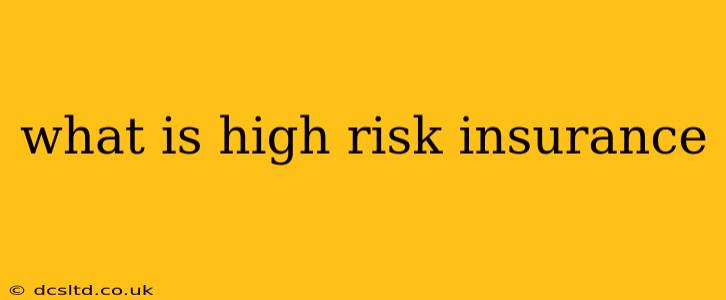High-risk insurance refers to policies designed for individuals or businesses deemed to pose a greater-than-average risk to insurance companies. This increased risk translates to higher premiums and potentially more stringent underwriting requirements. Instead of being excluded from coverage entirely, these specialized policies cater to the needs of those facing challenges securing standard insurance. But what exactly constitutes "high-risk," and what types of insurance fall under this category? Let's delve deeper.
What Makes Someone or Something a High-Risk?
Several factors contribute to a higher-risk designation. These factors vary depending on the type of insurance, but some common examples include:
- Poor driving record: Multiple accidents, speeding tickets, DUIs, or reckless driving incidents significantly increase the risk associated with auto insurance.
- Pre-existing medical conditions: Individuals with chronic illnesses, a history of serious health issues, or genetic predispositions may face higher premiums for health insurance.
- Prior claims history: Frequent claims in any insurance category (home, auto, health) suggest a higher likelihood of future claims, leading to increased premiums.
- Occupational hazards: Certain professions involve inherent risks that elevate insurance costs. Examples include construction workers, firefighters, or police officers.
- Property location: Homes located in high-crime areas, flood zones, or areas prone to wildfires are deemed riskier and therefore more expensive to insure.
- Business type: Certain business operations—like those involving hazardous materials or potentially dangerous activities—carry significantly higher liability risks.
- Credit history: In some cases, a poor credit score can impact insurance premiums, reflecting a perceived greater risk of non-payment.
Types of High-Risk Insurance
High-risk policies are available across several insurance categories. Here are some common examples:
- High-Risk Auto Insurance: Designed for drivers with poor driving records or those operating high-performance vehicles.
- High-Risk Homeowners Insurance: For properties located in high-risk areas or those with specific structural issues or inadequate security measures.
- High-Risk Health Insurance: Provides coverage for individuals with pre-existing health conditions or those who have been denied coverage by standard insurers. (Note: The Affordable Care Act has significantly reduced the impact of pre-existing conditions on health insurance accessibility in many regions, but some limitations may still exist).
- High-Risk Life Insurance: Offers coverage for individuals with health conditions or lifestyles that make them ineligible for standard life insurance policies.
- High-Risk Commercial Insurance: Protects businesses with elevated liability risks due to the nature of their operations or location. This can include various types of liability, property, and workers' compensation insurance.
Finding High-Risk Insurance: What to Expect
Securing high-risk insurance might require more effort and involve higher costs. Here are some key considerations:
- Higher Premiums: Expect significantly higher premiums compared to standard insurance rates due to the increased risk assessment.
- Stricter Underwriting: Insurance companies will carefully scrutinize your application and request detailed information to assess your risk profile. Be prepared to provide extensive documentation.
- Specialized Insurers: You may need to work with specialized insurers that focus on high-risk clientele.
- Limited Coverage Options: Some coverage options might be restricted or unavailable compared to standard policies.
What are the differences between high-risk and standard insurance?
Standard insurance policies are designed for individuals and businesses considered to have an average level of risk. They typically offer more competitive premiums and a wider range of coverage options. High-risk insurance, conversely, caters to those with higher-than-average risk profiles, resulting in increased premiums and potentially more restrictive coverage.
How can I find high-risk insurance?
Finding high-risk insurance might involve contacting multiple insurers, including those specializing in high-risk clients. Independent insurance agents can be particularly helpful in navigating this process. They have access to a wider range of insurers and can assist in finding the most appropriate coverage for your specific circumstances. Online comparison tools can also be used, though it's crucial to carefully review the policy details to ensure you understand the coverage and limitations.
What factors influence the cost of high-risk insurance?
The cost of high-risk insurance is heavily influenced by the specific risk factors associated with the individual or business. These can include prior claims history, location, driving record, occupation, health status, and the nature of the business operation. Each factor contributes to the overall risk assessment, ultimately determining the premium cost.
Is high-risk insurance worth it?
The decision of whether high-risk insurance is "worth it" depends on your individual circumstances and risk tolerance. While premiums are higher, the potential financial consequences of being uninsured in a high-risk situation could be far greater. Carefully weigh the costs of coverage against the potential financial losses you might face without it. Consulting with an independent insurance agent can provide valuable insights into your options and help you make an informed decision.
This information is for general knowledge and should not be considered professional insurance advice. Consult with a licensed insurance professional for personalized guidance on your specific insurance needs.
